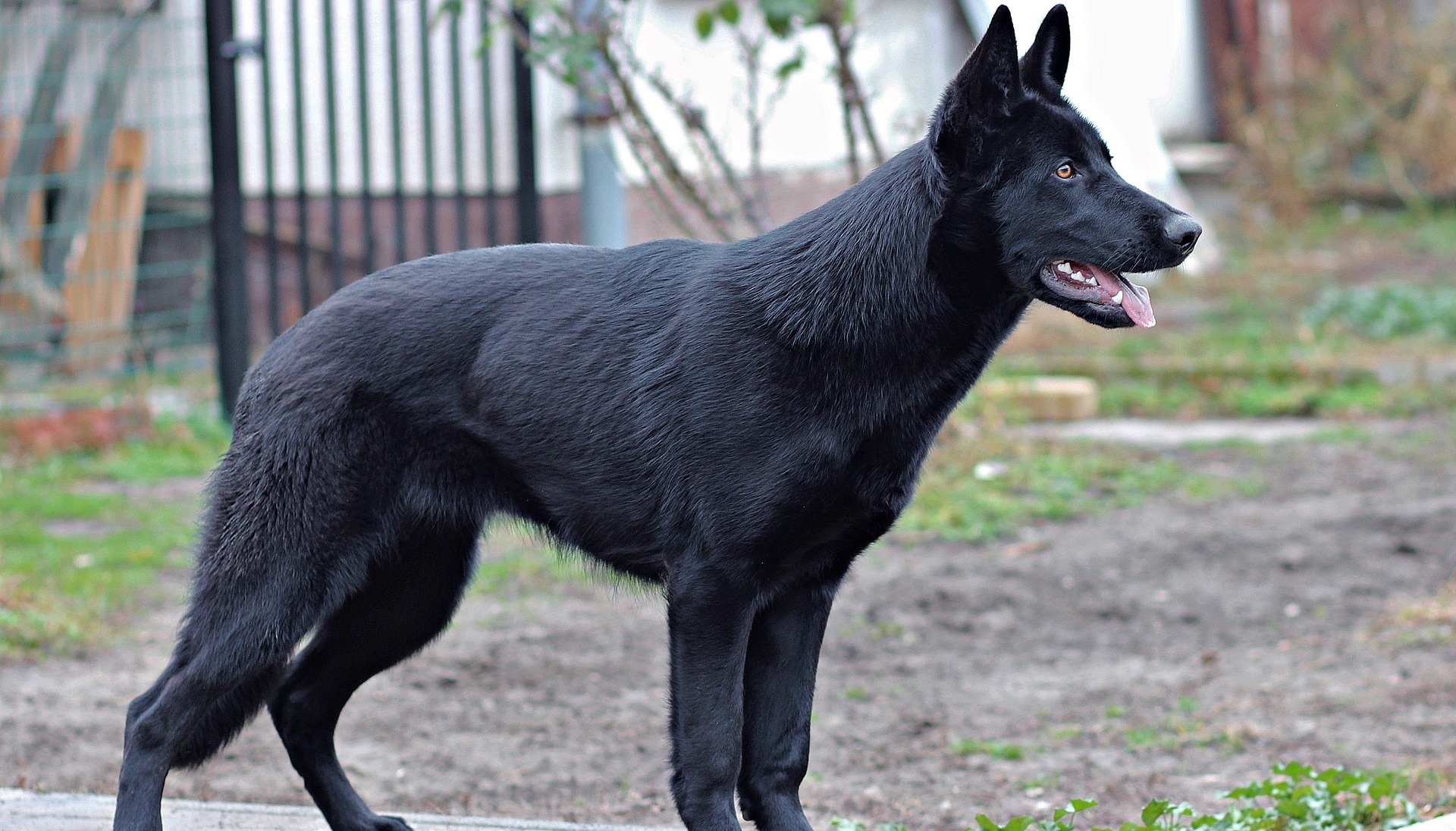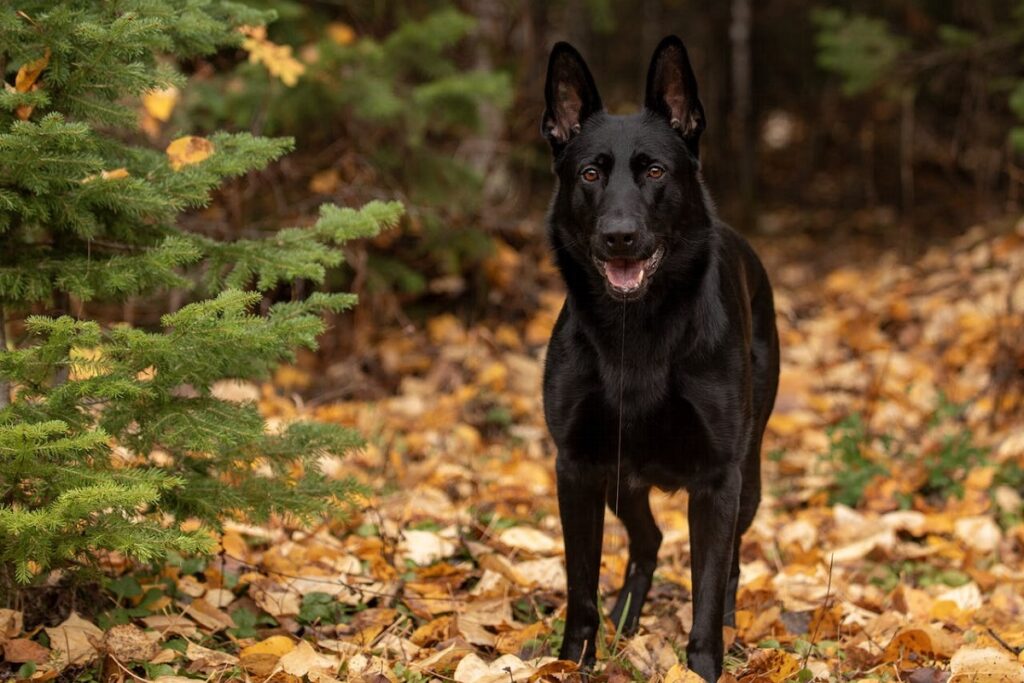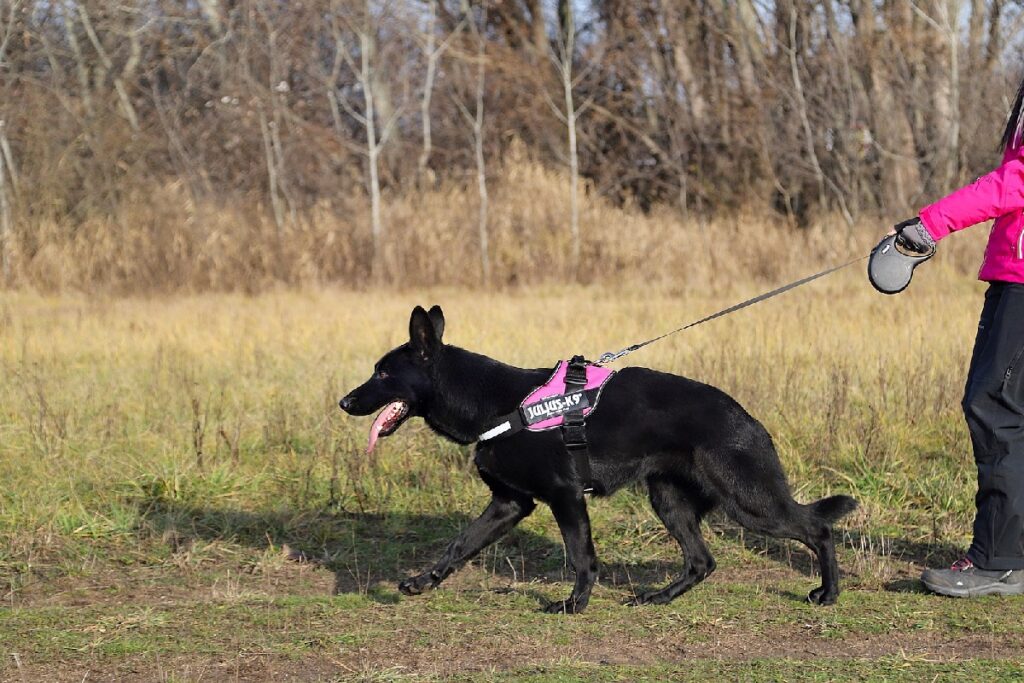The sleek, enigmatic Black German Shepherd often draws curious glances. Sharing the intelligence and loyalty of their more common sable counterparts, these striking dogs boast unique allure. This comprehensive guide delves into the fascinating world of the Black German Shepherd, exploring their distinct traits, specific care requirements, and debunking common myths surrounding their temperament and health. Discover if this captivating breed is the right fit for your family, and learn how to provide them with a happy, healthy life.
Discover the black German shepherd, a remarkable variation of the traditional breed. In this article, we explore what makes them unique beyond their striking black coat, how they compare to other German Shepherds in terms of temperament, and what you need to know about their care and health.
If you’re considering bringing one of these loyal and intelligent dogs into your home, you’re in the right place to learn more.
Key Takeaways
- Black German Shepherds share genetic and physical traits with standard German Shepherds, distinguished primarily by their recessive gene-induced solid black coat, which also contributes to their rarity and higher cost.
- These dogs are known for their intelligence, trainability, and protective instincts, which make them excellent workers and loyal family pets, but they require significant socialization and mental stimulation to manage their strong protective traits.
- Health-wise, Black German Shepherds are predisposed to conditions like hip dysplasia and degenerative myelopathy; thus, prospective owners should focus on preventative care, nutritional diets, and regular exercise while also considering ethical breeding practices or adoption from shelters.
Unveiling the Essence of Black German Shepherds
Black German Shepherd dogs, recognized by their striking solid black coats, are a sight to behold. But their allure goes beyond their color—underneath their dark cloak, they share the same robust and agile structure as other German Shepherds. Dark-colored eyes, an attribute of their purebred lineage, further accentuate their charm.
They’re not just pretty faces, either. Known for their social, intelligent, and trainable attributes, Black German Shepherds are as adept at work as they are at companionship. Whether you’re looking for a diligent worker or a loyal family pet, a Black German Shepherd won’t disappoint.
The Genetics Behind the Black Coat
Let’s simplify the science behind their stunning black fur. It comes from a rare gene in purebred German Shepherds, not from crossbreeding different breeds. The black coat of a German Shepherd isn’t just a fashion statement; it’s all about genetics.
To have a completely black coat, a German Shepherd needs to inherit two special ‘black color’ genes – one from mom and one from dad. These genes are like hidden treasures, not always seen at first glance, but when a puppy gets one from each parent, voila! You get that beautiful, shiny black coat.
The birth of a Black German Shepherd puppy necessitates that both parents carry the recessive black gene. This means that even if the parents don’t boast a black coat themselves, they can still produce black offspring if they possess the recessive gene.
It’s a fascinating interplay of genetics that leads to the creation of these black beauties.
Rarity of the Solid Black Coat
The solid black coat of a purebred German Shepherd is a rarity, with only about a 7% to 10% chance of producing a black puppy during normal breeding. This rarity contributes to their less common presence in the population, making them all the more unique.
Their rare coat doesn’t just add to their charm—it also impacts their price. The specific breeding efforts required to produce these solid black gems result in a higher cost when sourced from reputable breeders, making them more expensive than their black-and-tan counterparts.
But for many, the attractive allure of these dogs is worth the extra cost.
Predicting Puppy Coloration
Assessing the coat color of German Shepherd puppies can be a bit of a challenge. However, genetic testing can provide more accurate predictions, offering insight into whether the puppies will express agouti coat colors or have solid pigmentation.
Predicting the birth of a solid black German Shepherd puppy is complex without such testing, as only dogs with two copies of the recessive black gene will have a completely black coat. Thankfully, a German Shepherd puppy’s true coat color can be determined at around 8 weeks of age.
So, while genetics might seem like a complicated puzzle, with a bit of patience, the pieces will fall into place.
Physical Attributes: More Than Just Color
Peering past their coat color reveals that Black German Shepherds possess the same physical characteristics as other German Shepherd dogs. They have erect ears, a muscular build, and double coats, just like their counterparts.
But that’s not all—Black German Shepherds can also be slightly larger in size due to a gene mutation responsible for their black coat. Therefore, although their dark, sleek coats immediately command attention, these dogs are much more than their distinctive appearance.
Size and Stature
Let’s discuss their size. Here are the average measurements for males and females:
- Males typically stand up to 26 inches tall
- Females reach no more than 24 inches in height
- Males typically weigh between 65 to 90 pounds
- Females commonly weigh between 50 to 75 pounds
Their substantial size is an important aspect to consider. A larger dog like the Black German Shepherd will need appropriate space and training. So, if you’re planning to have one as a pet, be ready for their significant size and the care that comes with it.
Coat Care and Grooming
The coat of a Black German Shepherd demands regular maintenance. Frequent brushing is essential to minimize shedding and keep their double coat healthy. During their twice-yearly ‘coat blowing’ phase, more intensive brushing is required.
Bathing should be done every couple of months to maintain skin and coat health, with overbathing avoided to prevent stripping natural oils, leading to skin irritation. Regular ear cleaning and nail trims are also crucial for their overall well-being.
Remember, good grooming habits instilled from the early puppy stage are vital for maintaining the health and appearance of your Black German Shepherd.
Temperament and Personality Traits
Examining the temperament of Black German Shepherds, we should clear up a common misunderstanding—they are not more aggressive than other German Shepherds. Their behavior towards children and strangers is not influenced by their coat color.
In reality, Black German Shepherds, belonging to the German Shepherd breed, are known for their loving and intelligent temperament. They were bred with guarding instincts, leading to a significant protective nature, but this doesn’t translate to increased aggression.
Their protective instincts can manifest as overprotectiveness when not managed with training. Despite this, they are devoted to their families and thrive in a household where they can receive attention.
Their intelligence and willingness to please make them highly trainable, excelling in learning commands and performing various tasks.
The Importance of Proper Socialization
Adequate socialization is vital in training Black German Shepherds to ensure they grow into well-rounded and friendly dogs. Without sufficient socialization, Black German Shepherds can develop overly protective behavior.
It’s advisable to expose them to a variety of people and animals at a young age to prevent fearfulness or aggression. Even as adults, they can benefit from attending socialization classes. Remember, their protective instincts and temperament necessitate extensive socialization and training.
Training and Mental Stimulation
Black German Shepherds need both training and mental stimulation. Early obedience training lays a critical foundation for future learning and good behavior. Starting socialization from puppyhood makes training easier and fosters appropriate social behaviors.
Black German Shepherds require:
- Mental stimulation through games and challenges to keep them sharp for work and daily activities
- Regular, controlled exercise to help mitigate the progression of joint diseases
- At least two medium-to-long walks per day to meet their exercise needs and to prevent boredom and destructive behaviors.
Health and Longevity of Black German Shepherds
Black German Shepherds, like their counterparts, are prone to certain health problems, notably hip and elbow dysplasia, and degenerative myelopathy, among other potential back and joint problems.
While the chances for them to develop hip and elbow dysplasia are slimmer compared to traditional German Shepherds, these conditions remain a concern.
Degenerative myelopathy is a hereditary neurological condition that results in paralysis of the hind legs, affecting Black German Shepherds and requiring attention from owners to identify symptoms early.
Annual veterinary visits, preventative medications, and up-to-date vaccinations play a crucial role in ensuring their health and longevity.
Preventative Measures for Common Health Issues
In matters of health, it’s always preferable to prevent rather than cure. Choosing breeders who perform comprehensive health checks and who are committed to good breeding practices can significantly decrease the prevalence of hip dysplasia.
Maintaining a healthy weight through proper nutrition during a puppy’s growth period is critical to reducing the risk of developing health issues like hip dysplasia. Supplements like glucosamine and chondroitin are recommended for supporting joint health.
To prevent gastric dilatation and volvulus (GDV), steps such as preventative gastropexy, avoiding exercise immediately before or after eating, and early diagnosis for better management of this condition are recommended.
Diet and Exercise
Maintaining the health and well-being of Black German Shepherds hinges on a balanced diet and regular exercise. They require a balanced diet that is tailored to their life stage, size, and activity level to meet their specific nutritional needs.
Adult Black German Shepherds need diets containing 18-22% protein and 5-8% fats, while puppies require 22-24% protein and up to 10% fats.
To prevent bloat, feeding routines should be consistent, with food formulated for large breed puppies, and special dietary needs like hypoallergenic meals should be considered for dogs with food allergies.
At least two hours of exercise per day involving activities such as long walks, runs, playtime, and agility exercises is crucial to maintain optimal health and manage body weight.
The Role of Black German Shepherds in Work and Service
Known for their work ethic and adaptability, Black German Shepherds excel in a range of roles, including police, military, and disability aid dogs. In law enforcement and military operations, they undertake critical tasks, including patrol, detection of narcotics and explosives, and tracking and apprehension of suspects.
Black German Shepherds serve as:
- Guide dogs assisting the blind in navigation
- Hearing dogs, alerting deaf individuals to crucial sounds
- Psychiatric service dogs supporting people with mental health conditions
Their versatility and adaptability make them a valuable asset in various fields.
Black German Shepherds as Family Pets
Black German Shepherds, also known as black GSD or black shepherd dogs, are recognized for their protective, loyal, and affectionate disposition when it comes to being family pets. They are gentle with children and serve as alert and reliable home guardians, fitting well into the family environment.
Black German Shepherds can adeptly balance their roles between being loving companions and trained work dogs due to their balanced temperament.
German shepherds require regular physical exercise and engaging activities such as training sessions, puzzle toys, and scent work to maintain their happiness and health. These purebred German Shepherds, especially the black German variety, are highly sought after for their intelligence and loyalty, just like the standard German Shepherd.
Adopting a Black German Shepherd can be a heartwarming and rewarding experience, offering a loving home to a dog in need.
Ethical Breeding and Adoption Considerations
Thoughts of bringing a Black German Shepherd into your life should always be accompanied by considerations of ethical breeding and adoption. Purchasing from qualified breeders is important to recognize and reduce health problems through careful breeding.
Prospective Black German Shepherd owners should ask breeders about the parents’ health history, inspect the health of both parents and the litter, and learn about the breeding practices.
Adopting from shelters or rescues gives Black German Shepherds a second chance and potentially saves their lives. Potential owners looking for more affordable options or wishing to adopt can look at local shelters for Black German Shepherds in need of a home.
Questions to Ask Breeders
Several questions need to be raised when selecting a reputable breeder. Inquire if they prioritize health and temperament over colorations and mutations when breeding Black German Shepherds.
Ask about any titles or accomplishments the parents of the Black German Shepherd puppies may have in real-world work or sports to understand if the puppies are likely to inherit desirable traits.
It’s also important to determine if the breeding dogs continue to undergo training after achieving titles. Lastly, verify whether the breeder offers a health guarantee for the Black German Shepherd puppies and understand the terms and conditions of the purchase contract.
Supporting Rescue and Adoption
Backing rescue and adoption initiatives for Black German Shepherds can yield a fulfilling experience. Encouraging adoption from local shelters benefits both the dogs and those who bring them into their homes.
Adopting rescues like Black German Shepherds provides them with a chance for a happier life free from the confines of shelters. Dog rescue organizations play a crucial role in saving lives and nurturing Black German Shepherds until they find their forever homes.
Frequently Asked Questions
How Rare Is a Black German Shepherd?
Black German Shepherds are rare dogs, making up only 6.8% of the entire German Shepherd population. Despite this, they are the same breed as standard German Shepherds with some differences.
How Much Is a Black German Shepherd Worth?
A black German Shepherd can cost around $1800-$2000, with the rare Panda color being the most expensive at around $3500. Keep in mind that puppies with championship bloodlines can cost as much as $6000.
Do Black German Shepherds Have a Different Temperament?
Black German Shepherds have a similar temperament to other German Shepherds, making them great guard dogs, but they may not be suitable for every family.
What Is the Rarest German Shepherd Color?
The rarest German Shepherd color is Isabella-colored, also known as lilac German Shepherds, which result from the recessive combination of blue and liver pigment from their parents.
Are Black German Shepherds More Aggressive than Other German Shepherds?
No, the color of a German Shepherd’s coat does not determine its aggression levels. Their behavior is not influenced by their coat color.
Conclusion
Black German Shepherds are more than their striking black coats. They are intelligent, trainable, and adaptable dogs, excelling in various roles and making excellent family pets.
It’s essential to understand their unique traits, health considerations, and the importance of ethical breeding and adoption.
Whether you’re considering bringing a Black German Shepherd into your home or simply intrigued by this captivating breed, we hope this guide has provided you with valuable insights into these magnificent dogs.
The Black German Shepherd, often mistaken for a separate breed, is simply a beautiful color variation of the beloved GSD. Sharing the same intelligence, loyalty, and drive, they require identical training and care. Debunking common myths about aggression or rarity highlights that temperament depends on individual breeding and socialization, not coat color. Responsible ownership, including consistent training and proper exercise, remains crucial for these energetic dogs. Ultimately, a Black German Shepherd offers the same loyal companionship and working potential as any other GSD, wrapped in a striking, ebony package.







